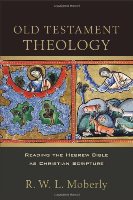Reviewed by Wyatt Graham
Introduction & Overview
R. W. L. Moberly’s book contributes to the burgeoning field of the Theological Interpretation of Scripture (TIS). Hence, Moberly’s Old Testament theology focuses not only on what the text meant to its original audience, but also on what it means for Christians today. He believes that when Christians read the Old Testament, they participate in its ongoing story: “performance is the ultimate goal of this study of the Hebrew Bible as Christian Scripture” (288).
Moberly has structured his work in a unique way. Instead of writing a comprehensive work of theology, Moberly opts to choose a few key passages in the Hebrew Bible, and performs a careful interpretation of each.
The first three chapters discuss key passages in the Pentateuch, including the Great Shema, Israel’s election and the ban against Canaan (Deut 7), and the manna narrative (Exod 16). In his fourth chapter, Moberly discusses the possibility of God changing, focusing on Jeremiah 18:1–12. Moberly next studies Isaiah and suggests ways that Christians can relate the prophetic book to Jesus. In the last three chapters, Moberly highlights the difficulty of living out theological convictions (Jonah), the intersection between faith and perplexity in the Christian life (the Psalms), and how to endure extreme suffering (Job 28).
Evaluation
Moberly’s prose is engaging and clear. His clarity extends into each chapter’s structure. In every chapter, Moberly begins by studying the “world in the text” (literary context) and ends by appealing to the “world in front of the text” (readers). Thus, he aims to perform a theological reading of the text, which aims to be relevant to readers.
This reader-orientated reading strategy is most evident in the last three chapters of Moberly’s work. Chapter 6 deals with Jonah’s knowledge of religion but stubborn refusal to appropriate it. In his case, Jonah confessed God’s mercy but found it hard to be merciful. In chapter 7, Moberly uses Psalms 44 and 89 to discuss how Christian confessions of God’s faithfulness sometimes do not match up to the realities of suffering and injustice. In the last chapter, Moberly explains how Job 28 teaches readers how to respond to God during extreme suffering. The short answer, according to Moberly, is to trust God with integrity.
While applying the Hebrew Bible’s message to Christian readers is admirable, it is also a liability. For Moberly, what the text meant may have little to do with what the text means (218 n.14). What the text means for Christians may not be any more accurate than what it means for Jewish interpreters (282–3). Moberly interprets the text from a Christian frame of reference, which is simply one among many perspectives (282).
A clear of example of how a frame of reference creates meaning in a text, according to Moberly, is when the Gospel of John claims that Jesus appeared on the throne in Isaiah 6 (John 12:41). Moberly writes of the Gospel’s claim, “This is not what is envisaged in Isaiah’s own frame of reference. But this is how his subject matter can be understood and appropriated when his words are recontextualized as part of Christian Scripture” (179). In other words, the Gospel writer brought a Christian frame of reference to Isaiah 6 and recontextualized it in a Christian way (i.e., he made it refer to Jesus not YHWH).
Moberly’s position is troublesome, because it appears to make Christian interpretation of the Hebrew Bible merely one of many valid interpretations. While Moberly does admit to some readings of Scripture being better than others (283), it is difficult to see how the Christian reading is better than, say, a Jewish reading. This level of subjectivity militates against traditional Christian claims that the New Testament rightly and truly fulfills Old Testament patterns and prophecies.
Another weakness to Moberly’s work involves his methodology. Moberly picks a few passages and thoroughly interprets them. While this paints a broad picture of Old Testament theology, the lack of comprehensiveness belies the book’s claim of being an Old Testament theology. Moberly fails to build an Old Testament theology from the entire body of the Old Testament, which pays attention to the Bible’s own internal development.
One also wonders if Moberly’s choice of texts guides his Old Testament theology rather than the Old Testament itself. While a professor in Durham may select certain texts to summarize Old Testament theology, a South American writer may choose a different set of passages. We are all situated. The only way to allow the Old Testament to control the discussion rather than interpreter’s selection of texts is to study the whole Old Testament. Moberly’s work may better be titled, An Interpretation of Select Old Testament Texts.
A final weakness is that a few of Moberly’s interpretations are untenable when one relates these interpretations to the rest of the Old Testament. A key example is his interpretation of holy war in Deuteronomy 7. Moberly believes that God’s command to annihilate the Canaanites is metaphorical language, which aims to induce Israel to give their full allegiance to YHWH (62). Thus, the language of absolutely destroying those living in the Promised Land is simply figural. However, this interpretation seems problematic when one takes into account the book of Joshua. Joshua records Israel literally annihilating many Canaanites who were living in the Promised Land.
With that said, Moberly’s Old Testament Theology is a well-written and thoughtful work of theology. Moberly’s work engages the Hebrew Bible and attempts to communicate its message to Christian readers. Nevertheless, Moberly’s reader-orientated hermeneutic that gives equal credence to Jewish interpretation as it does Christian interpretation, his limited selection of Old Testament texts, and his improbable reading of texts at a canonical level conflict with basic Christian convictions about the Bible. Because of this, Pastors, students and interested readers alike will need to read Moberly with a critical eye.
Wyatt Graham is a PhD student at the Southern Baptist Theological Seminary.
